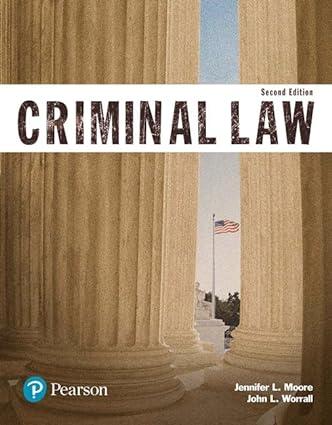Decina was charged with criminal negligence in operating an automobile with knowledge that he was subject to
Question:
Decina was charged with criminal negligence in operating an automobile with knowledge that he was subject to epileptic seizures. He drove erratically at high speeds and his car struck a group of young schoolgirls on the sidewalk. His car ultimately crashed into a brick wall of a grocery store.
When the car came to a halt in the store, with its horn still blowing, several fires had been ignited. Defendant was stooped over in the car and was ‘bobbing a little’. To one witness he appeared dazed, to another unconscious, lying back with his hands off the wheel. Various people present shouted to defendant to turn off the ignition of his car, and ‘within a matter of seconds the horn stopped blowing and the car did shut off’.
Defendant was pulled out of the car by a number of bystanders and laid down on the sidewalk. To a policeman who came on the scene shortly he appeared ‘injured, dazed’; another witness said that ‘he looked as though he was knocked out, and his arm seemed to be bleeding’. An injured customer in the store, after receiving first aid, pressed defendant for an explanation of the accident and he told her: ‘I blacked out from the bridge’.
. . . On the basis of this medical history, Dr. Wechter made a diagnosis of Jacksonian epilepsy, and was of the opinion that defendant had a seizure at the time of the accident . . . We turn first to the subject of defendant’s cross appeal, namely, that his demurrer should have been sustained, since the indictment here does not charge a crime. The indictment states essentially that defendant, knowing ‘that he was subject to epileptic attacks or other disorder rendering him likely to lose consciousness for a considerable period of time’, was culpably negligent ‘in that he consciously undertook to and did operate his Buick sedan on a public highway’ (emphasis supplied) and ‘while so doing’ suffered such an attack which caused said automobile ‘to travel at a fast and reckless rate of speed, jumping the curb and driving over the sidewalk’ causing the death of 4 persons. In our opinion, this clearly states a violation of section 1053-a of the Penal Law. The statute does not require that a defendant must deliberately intend to kill a human being, for that would be murder. Nor does the statute require that he knowingly and consciously follow the precise path that leads to death and destruction. It is sufficient, we have said, when his conduct manifests a ‘disregard of the consequences which may ensue from the act, and indifference to the rights of others. No clearer definition, applicable to the hundreds of varying circumstances that may arise, can be given. Under a given state of facts, whether negligence is culpable is a question of judgment.’
Questions:
1. Did Decina commit a “voluntary act” that resulted in the car accident?
2. Is it relevant that Decina knew he was subject to seizures? If so, why?
3. Is Decina’s case different from a driver who suffers a heart attack or a stroke while driving? If so, why?
Step by Step Answer:






